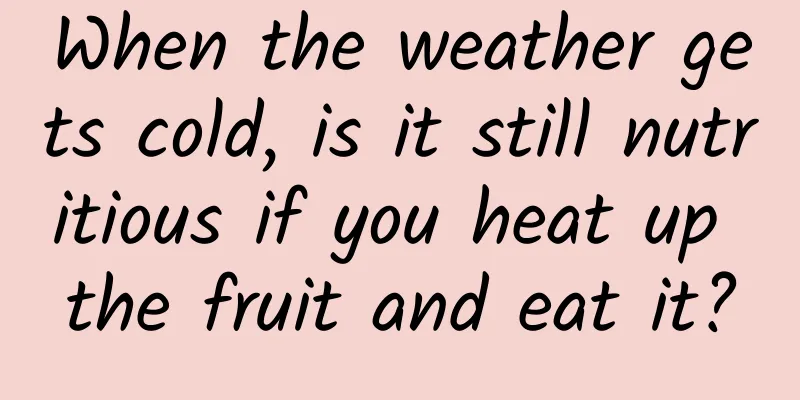When the weather gets cold, is it still nutritious if you heat up the fruit and eat it?

|
Audit expert: Peng Guoqiu Deputy Chief Physician, Fourth Medical Center, PLA General Hospital The weather is too cold in winter, and I just want to eat something hot. Even fruits make my teeth feel cold? In fact, fruits can be heated up and eaten properly, which is good for health. So, will the nutrients of fruits be lost after heating? What are the benefits of heated fruits? Vitamins are easy to reduce, but the impact is not significant The main nutrients in fruits are: a large amount of water, a certain amount of carbohydrates and dietary fiber, a small amount of protein, fat, vitamins, minerals, various enzymes, organic acids, plant compounds, etc. Most of these components are not lost after heating. The ones that are easily affected by heating are mainly vitamins and certain plant compounds. The content of plant compounds is small and the changes are complex. So generally speaking, when people discuss the impact of heating on the nutritional value of fruits and vegetables, they mainly focus on vitamins. Different types of vitamins have different properties and their stability under various conditions varies. For example, vitamin C and B group are easily soluble in water, so the loss by boiling in water will be greater than the loss by steaming. Vitamins A and E are fat-soluble vitamins, and their loss after cooking is relatively small; vitamin C is more sensitive to high temperatures and its loss is slightly greater; vitamin B1 is the most unstable and its loss is greater. Studies have found that the "water bath method" of soaking fruits in hot water for 1 to 2 minutes to raise the temperature of the fruit's surface has an almost negligible effect on vitamins. If it is cooked by heating, some vitamins will be lost, but the impact will not be significant. A study compared the vitamin content of common foods in "raw" and "cooked" states, and estimated that the loss of various vitamins after heating ranges from approximately 10% to 26%. It can be seen that only a part of the vitamins are lost, and there are still a lot left; plus vitamins are only a part of the fruit, so there is no need to worry too much about these losses. Vitamin loss ≠ food without nutrition The minerals and dietary fiber in fruits will not be destroyed by heating and will remain in the food. Antioxidants such as polyphenols also have less loss during the heating process, and microwave heating may even increase their content. In addition, lutein is not only heat-resistant, but also acid- and alkali-resistant, so it is not afraid of being heated by any kind of water. Eating heated fruits is more beneficial to gastrointestinal function After the fruit is heated, the cell walls will be damaged to a certain extent, the cellulose will soften, the pectin will dissolve, the dietary fiber will be more easily utilized in the intestines, and will cause less irritation to the gastrointestinal tract. The polyphenols and tannins in fruits have a certain inhibitory effect on digestive enzymes. After the proteases in raw fruits enter the human body, they may also cause certain irritation to the oral cavity and digestive tract walls. For example, pineapples are very "pungent". After heating, proteases, tannins, and phenolic substances will be destroyed to varying degrees, reducing irritation to the oral cavity and gastrointestinal tract; it also reduces the inhibition of digestive enzymes, making it more friendly to people with poor digestive function. Some children may be allergic to the protease in fruits, and heating can also help reduce allergic reactions. In addition, the lycopene in some fruits is more easily absorbed by the human body after heating. Therefore, fruits rich in lycopene, such as guava, watermelon, papaya, and grapefruit, are completely suitable for eating cooked from the perspective of lycopene. How to heat fruit before eating? Cook and eat Cut the fruit into pieces and peel them, then boil them in water for about 20 minutes (the stewing time can be extended appropriately). Fruits suitable for boiling include pears, apples, sugar cane, hawthorn, oranges, strawberries, etc. Steamed Prepare the fruit, place it on the steaming rack, and steam it over low heat for no more than 20 minutes. Fruits suitable for steaming: apples, pears, oranges, hawthorns, grapefruits, etc. Microwave Heating This cooking method has high heating efficiency, short cooking time, less loss of nutrients, and may also increase the content of polyphenols in fruits. Fruits suitable for microwave heating: apples, pears, apricots and other hard fruits. But before putting the fruit into the microwave, remember to cut the fruit into small pieces first. Grapes, blueberries, cherry tomatoes, etc. should not be heated in the microwave as a whole to avoid explosion. Warm water soak Put the fruit in warm water that does not exceed 50℃, or peel and cut the fruit into slices and heat it in warm water. Fruits suitable for soaking in warm water: As long as it is a fruit that is suitable for eating "hot", this method can be used, such as soaking apples. |
<<: What should you pay attention to when caring for bedridden patients?
>>: Spring sleep is disturbed by snoring day and night, beware of sleep assassins
Recommend
What medicine is used for vaginal pain
Many women experience vaginal pain due to various...
Second child scar uterus normal delivery conditions
If a woman with a scarred uterus wants to give bi...
Picture of blood discharge from uterus
Nowadays, many girls like to eat cold food, espec...
Treat intestinal polyps early to prevent them from turning into rectal cancer
Author: Tang Qin, Deputy Secretary-General and Re...
How to tell if your water has broken during pregnancy
Pregnant women, especially first-time mothers, ar...
How to eliminate stretch marks for pregnant women
Being a mother is the greatest profession in the ...
What is vaginal fever?
In life, many women have some gynecological disea...
How many days of delayed menstruation is considered pregnancy
After sexual intercourse, semen accumulates in th...
Why is my breast swelling and pain during menstruation?
For many women, menstruation is a very uncomforta...
Can I drink rose water during menstruation?
The menstrual period is a special period for any ...
Stretch marks on back
Stretch marks are also called atrophy marks, and ...
What causes a thick placenta?
Thick placenta is a common physical condition for...
When do girls start wearing bras?
When girls reach a certain age and their breasts ...









